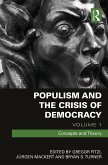The book proposes a comparison of Durkheim's and Habermas's views about public communication and democratic deliberation. They seem to share an understanding that democratic deliberation requires support from the public sphere. Nonetheless, Durkheim believed that rational public communication must gain strength from ceremonies, whereas Habermas essentially focused on communicative rationality and rational discourse within the public sphere. The book thus asks whether Habermas's theory of rational discourse implies a rationalist fallacy, largely because he offers no plausible explanation of the way in which social actors are emotionally motivated to participate in rational discourses, rather than resorting to violence and manipulation. Could Durkheim's view about public communication, and its need to gather strength from collective ceremonies and collective sentiments, resolve this theoretical conundrum in that Durkheim's view is complementary to Habermas's?
Hinweis: Dieser Artikel kann nur an eine deutsche Lieferadresse ausgeliefert werden.
Hinweis: Dieser Artikel kann nur an eine deutsche Lieferadresse ausgeliefert werden.








